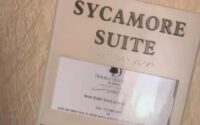Expert reveals best and worst time to sleep on a plane
One of the first things people do when they settle into their plane seat is either drift off to sleep or get straight into a movie marathon.
They’re habits done out of boredom or when there’s a long journey ahead – but an expert has advised why this can be a bad idea, and when the best time is to have some shut-eye.
“It depends on the timezone you’re entering,” Rachel Beard, sleep wellness manager at A.H. Beard’s Sleep Wellness Center told news.com.au.
“As soon as you get on the flight, adjust your clocks to your destination’s local time and sleep as you normally would there.
“It can be tempting to stay up and watch movies but if you look at your clock and see it’s 2 am in your destination, it’s probably a good idea to get some sleep.”
Ms. Beard said to avoid sleeping unless it’s within the sleeping hours of the timezone you are entering. She said to also keep this in mind when you’re eating and drinking both on and before the flight.
“If you’re about to have a massive change in timezone it would be best to avoid caffeine and a big, heavy meal before you need to sleep – even if it is at a normal time in your home timezone.”
When it comes to how long you should sleep on a flight, Ms. Beard said while again it comes down to the destination’s timezone, you should always balance out to seven and nine-hour total within a 24-hour period.
“While it’s best to have this sleep in one stretch, you can also use naps to make up for sleep and keep you from dipping into a deficit for the day,” she said.
“So if, even after your best efforts, you’re still not able to achieve a restful snooze on the plane then a nap at your destination is also a clever option.”

There’s a few factors outside of our control when it comes to getting some in-flight shut-eye, but Ms Beard said there’s still steps to take to achieve “premium sleep” – including controlling light, temperature, sound and minimizing screen time.
“Some of my top hacks are to wear an eye mask to minimize light, take noise canceling headphones to create a quiet environment (regardless of what’s going on around you in the cabin), and rather than watching movies, reading a book will help to avoid circadian-rhythm disturbance from the blue light.”
It’s always a bit tougher when you’re in the middle seat, with TikToker Jiny Maeng sharing a now-viral clip on how to best tackle this.
“A lot of you guys had an issue with putting your seat all the way back so I think you will like this one better,” she began. “First put the seat table down then get your three best friends – your jacket, blanket and a pillow.
“Pile them up nicely one-by-one and with the pillow put it up vertically and then rest your head. If you want to be more comfortable, hug the pile by putting your arm through it.”
The Sydney-based TikToker who has amassed 14.5 million likes on all her clips was praised for the tip.

“Just wish I saw this when I sat between 10 hours with two strangers back home to Norway from Korea,” one person wrote.
“Another LIFE CHANGING innovation,” said another.
Meanwhile, Ms Beard explained another way to reduce jetlag, was to try and maintain a normal routine for wherever you are and the timezone you’re living in.
“If you start snoozing too early or late you run the risk of further confusing your body clock and feeling the full effects of jet lag,” Ms. Beard said.
“If you’re struggling to kick into gear, make sure you’re drinking plenty of water and also try to move your body – a leisurely walk in fresh air and natural light is a great way to help reset into the new timezone.”

Ms. Beard said as a society, the impact of the pandemic has seen a shift in our priorities when it comes to health and wellness.
“People are looking for ways to maximize their health without sacrificing comfort, while also seeking memorable travel experiences after global lockdowns,” she said.
“It’s this type of thinking that leads to sleep tourism – a unique and luxurious way to experience a new environment while embracing a key pillar of health, our sleep.
“To support the rise of sleep tourism, hotels are offering premium sleep solutions in-built into their rooms such as temperature control specified to optimal sleep and blackout curtains.
“Many accommodation providers are also introducing more luxury sleep-centric options and personalized options for your stay such as offering tailored selections of pillows and mattress firmness for a truly premium experience.”


